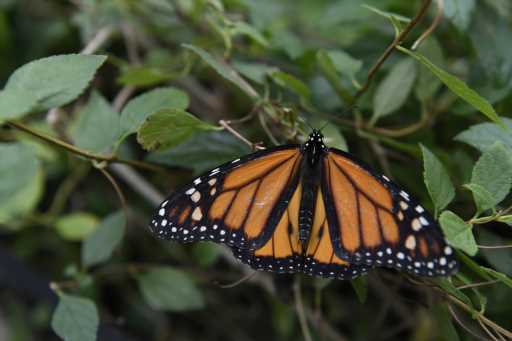Warmer temps and moisture aligned with the release of 400 native butterflies into a public sanctuary southwest of Denver — amid efforts by Colorado leaders to ensure better habitat for pollinator insects statewide.
This Chatfield Farms Butterfly House — run by Denver Botanic Gardens and the Westminster-based Butterfly Pavilion — opens Saturday on a 700-acre preserve west of Chatfield Reservoir along Deer Creek.
Gov. Jared Polis and his family are scheduled to visit the Butterfly Pavilion in Westminster on Friday, where Polis is expected to sign new legislation to launch state work to improve habitat for bees, butterflies and other pollinators essential for food supplies.
The legislation (SB22-199) directs the Colorado Department of Natural Resources to conduct a statewide habitat survey and determine how best to ensure survival of native pollinators.
A more aggressive bill that would have restricted the use of pesticides failed this year in the statehouse. But pollinator advocates said they’re delighted at the prospect of solid baseline information and that data showing where bees and butterflies can survive will improve conservation decisions.
The law requires state natural resources officials to conduct a study and develop recommendations by the end of next year to help pollinators withstand multiple threats. State officials then would implement a statewide pollinator protection plan.
The study will give “a jumping off point,” said Sara Stevens, director of animal collections for the Butterfly Pavilion. “The biggest component is going to be adding pollinator habitat. When we create new development, we need to make sure it is pollinator-friendly.”
Pollinators are crucial in growing food, she said, advocating creation of “pathways through our cities” — so that butterflies and bees “can navigate through our man-made structures.”
Every week at Chatfield Farms, Butterfly Pavilion crews plan to release another 150 butterflies at the seasonal butterfly house. These are all natives — including swallowtails, monarchs and mourning cloaks, about 40 species overall — flying around inside a netted 1,500 square-feet structure where visitors can stroll and see butterflies feeding on nectar-producing plants. (The admission fee, including access to broader botanic gardens, was set at $10 for adults and $7 for seniors and children with kids 2 and under admitted free.)
Source: Read Full Article
